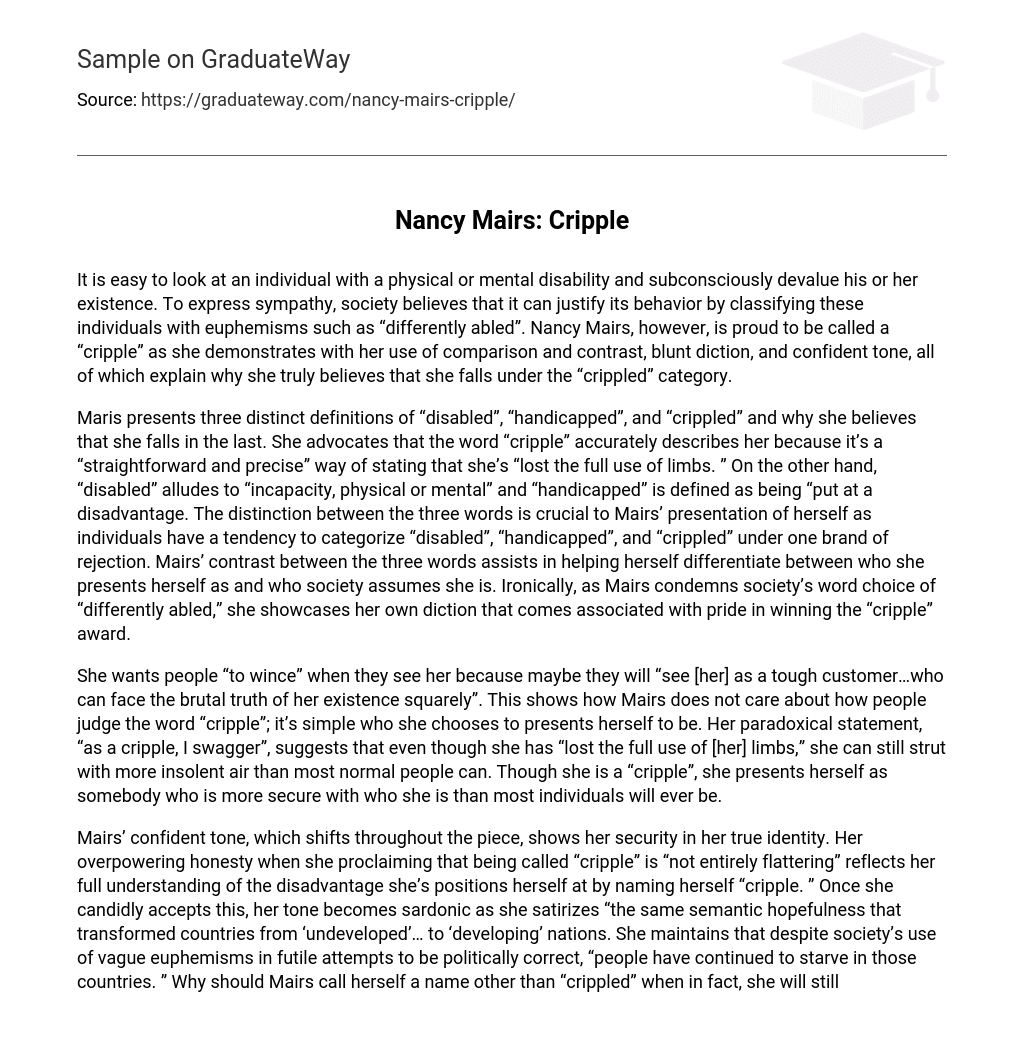The society tends to undermine the worth of individuals with physical or mental disabilities. By using euphemisms like “differently abled,” society tries to justify its behavior and express sympathy. However, Nancy Mairs takes pride in being called a “cripple” and believes she fits under this category. She supports her belief using comparison and contrast, straightforward language, and a confident tone.
In her presentation, Maris explains three different meanings for the words “disabled,” “handicapped,” and “crippled,” and argues that she identifies as the latter. She believes that “cripple” accurately describes her because it straightforwardly states that she has lost full use of her limbs. In contrast, she feels that “disabled” implies incapacity, both physically and mentally, while “handicapped” suggests being at a disadvantage. The distinction between these words is important to Maris as people tend to categorize them all as rejection. By highlighting the differences between these terms, Maris is able to distinguish herself from society’s assumptions about her. Ironically, even as she criticizes society’s use of the term “differently abled,” Maris proudly embraces her own use of the word “cripple.”
Mairs desires to elicit a strong reaction from people, hoping that they will view her with discomfort, perhaps perceiving her as a resilient individual who can confront the harsh realities of her existence without flinching. This underscores Mairs’ indifference towards how others perceive the term “cripple”, as she simply chooses to project herself in a certain manner. Her contradictory statement, “as a cripple, I swagger”, implies that despite having limited use of her limbs, she exudes a confident and audacious demeanor that surpasses that of typical individuals. Despite being labeled as a “cripple”, she presents herself as someone who possesses a greater level of self-assurance than most individuals will ever attain.
Mairs’ confident tone in the piece demonstrates her secure sense of self. She honestly admits that being called “cripple” is not flattering, acknowledging the disadvantage she places herself in by using that term. After accepting this reality, her tone becomes sardonic as she mocks the use of optimistic language to describe impoverished nations, noting that people still suffer despite such linguistic shifts. Mairs questions why she should use any other word than “crippled” when it accurately describes her condition. Ultimately, her tone becomes accepting as she reveals her indifference towards society’s judgement based on her label.
Mairs expresses herself with outspokenness as she declares that she would never label another person as a cripple, reserving that term only for herself. This highlights Mairs’ self-acceptance while also considering others’ preference for a less offensive term. Through the use of comparison and contrast, a straightforward choice of words, and a confident tone, Mairs shapes her own identity as a “cripple.” The reference to Orwell’s statement reinforces the idea that seemingly harmless euphemisms can subconsciously influence one’s thoughts. Mairs firmly believes that being “crippled” is her true identity, so why should she be called anything else?





